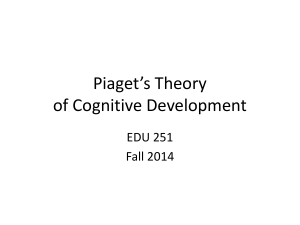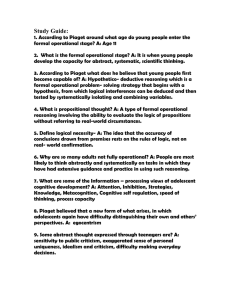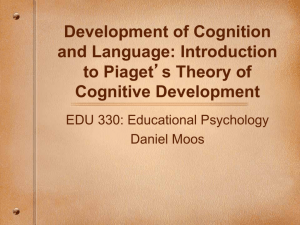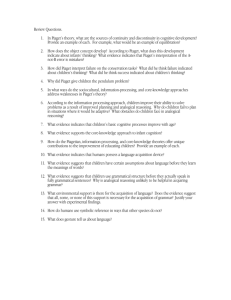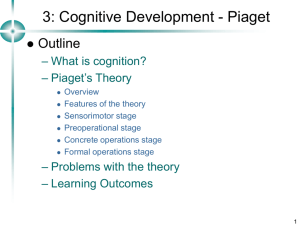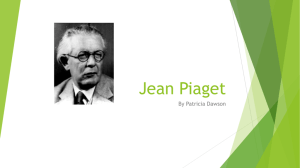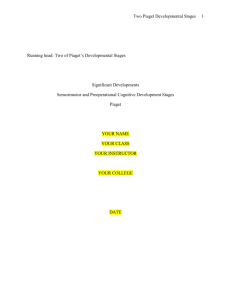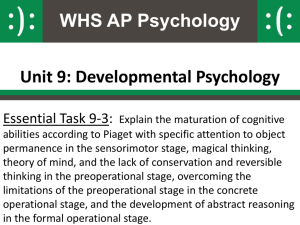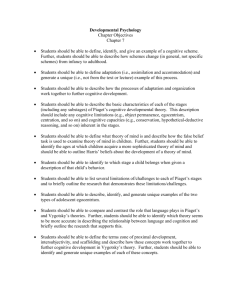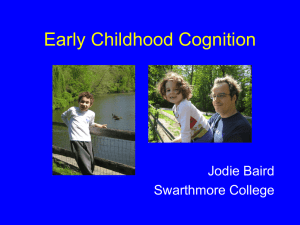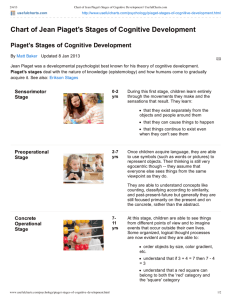Adol Psych Ch 6 - Traditional Approaches
advertisement
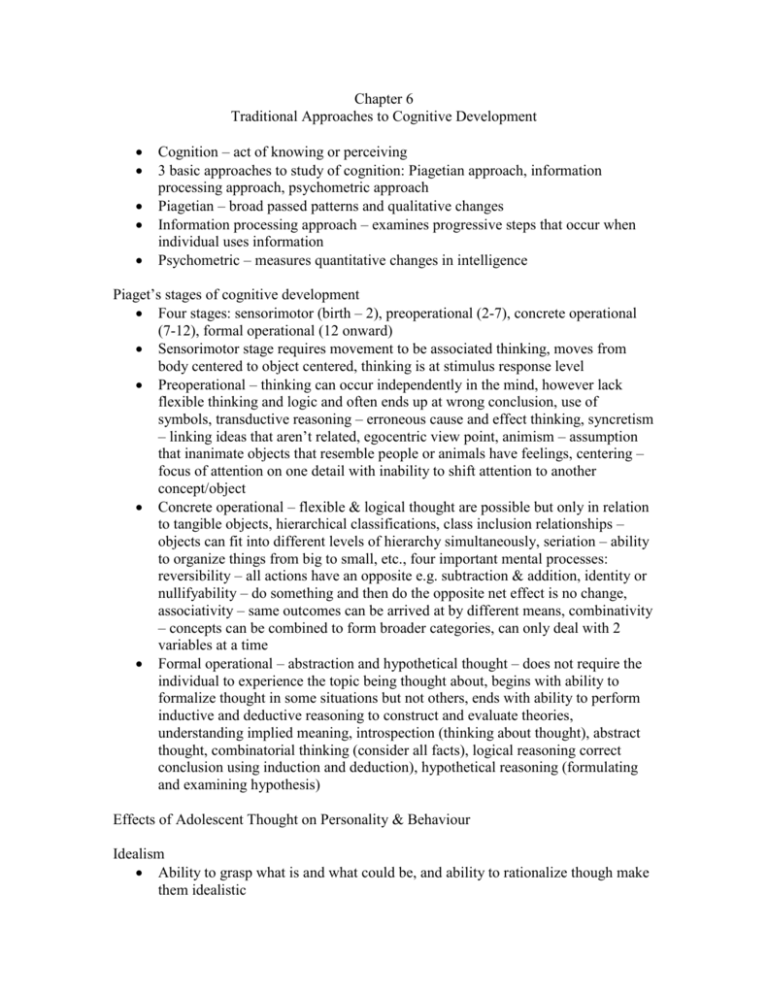
Chapter 6 Traditional Approaches to Cognitive Development Cognition – act of knowing or perceiving 3 basic approaches to study of cognition: Piagetian approach, information processing approach, psychometric approach Piagetian – broad passed patterns and qualitative changes Information processing approach – examines progressive steps that occur when individual uses information Psychometric – measures quantitative changes in intelligence Piaget’s stages of cognitive development Four stages: sensorimotor (birth – 2), preoperational (2-7), concrete operational (7-12), formal operational (12 onward) Sensorimotor stage requires movement to be associated thinking, moves from body centered to object centered, thinking is at stimulus response level Preoperational – thinking can occur independently in the mind, however lack flexible thinking and logic and often ends up at wrong conclusion, use of symbols, transductive reasoning – erroneous cause and effect thinking, syncretism – linking ideas that aren’t related, egocentric view point, animism – assumption that inanimate objects that resemble people or animals have feelings, centering – focus of attention on one detail with inability to shift attention to another concept/object Concrete operational – flexible & logical thought are possible but only in relation to tangible objects, hierarchical classifications, class inclusion relationships – objects can fit into different levels of hierarchy simultaneously, seriation – ability to organize things from big to small, etc., four important mental processes: reversibility – all actions have an opposite e.g. subtraction & addition, identity or nullifyability – do something and then do the opposite net effect is no change, associativity – same outcomes can be arrived at by different means, combinativity – concepts can be combined to form broader categories, can only deal with 2 variables at a time Formal operational – abstraction and hypothetical thought – does not require the individual to experience the topic being thought about, begins with ability to formalize thought in some situations but not others, ends with ability to perform inductive and deductive reasoning to construct and evaluate theories, understanding implied meaning, introspection (thinking about thought), abstract thought, combinatorial thinking (consider all facts), logical reasoning correct conclusion using induction and deduction), hypothetical reasoning (formulating and examining hypothesis) Effects of Adolescent Thought on Personality & Behaviour Idealism Ability to grasp what is and what could be, and ability to rationalize though make them idealistic Support the “underdog” – d/t own internal turmoil & insecurities allows them to associate with the weak/oppressed Long term values Start to see themselves as adults, develop life plan and be concerned with future Hypocrisy What they do and say often not the same – therefore hipocrits May be related to intellectual maturity whereby individual lacks ability to apply general theory to specific practice Pretending to be what they are not – may lead to not being able to live up to expectations e.g. parental, societal, leading adolescent to avoid contact Pseudostupidity Tendency to make situations harder than they are leading to failure Ability to perform formal operations allows them to think of alternatives but this ability is not fully controlled Egocentrism Imaginary audience – adolescents’ ability to think about themselves and their thoughts lead to idea that everyone else must be thinking about their thoughts as well – feel they are always “on stage” – leads to extreme self consciousness Personal fable – belief that their experiences are totally unique from anyone else’s May lead to feeling of invincibleness, or it can’t happen to me Introspection As become more able to think abstractly, feel everyone is observing them Development of personal fable makes them think they are deeper and more sensitive than others These points lead to introspection – thinking about own thoughts Close examinations of interactions with others Self concept Introspection allows for development of self identity Formal operational thinking allows them to develop assumptions about themselves Critique of Piaget’s Theory Children (sensorimotor, preoperational) more cognitively advanced than Piaget thought Infants are actually hard wired for certain knowledge – don’t have to learn from scratch Formal operational thought does not develop at the same time in different individuals, and in some cases may be very delayed (Low SES) or not occur at all (retarded) Most students are not beyond concrete operational stage by end of high school Individuals that can use formal operations don’t do so consistently – affected by anger, being upset, being rushed Piaget believed that although people would continue to learn, all the “hardware” they would ever have would be in place by mid-adolescence – current researchers disagree Dialectics – can integrate 2 or more conflicting pieces of information, formal thinkers tend to assume one argument is right and the other is wrong Dialectical thinker understands many aspects of the world are interconnected Arlin suggested a 5th stage of cognitive development called problem finding stage This stage characterized by creative thought, envisioning of new questions, new problem solving methods Formal thought is dependent on social experience, full attainment of formal thinking is not guaranteed Various cultural backgrounds show variability in abstract reasoning abilities Factors such as maternal intelligence, sociodemographic status, and the quality of the home environment relate to cognitive development Parents and schools that foster exchange of thoughts, ideational exploration, academic and occupation ambition, problem solving, abstract reasoning all lead to better cognitive development Formal operational tests only test what individual is capable of doing not what they will do – influenced by boredom, fatigue, motivation – all affect cognitive performance
